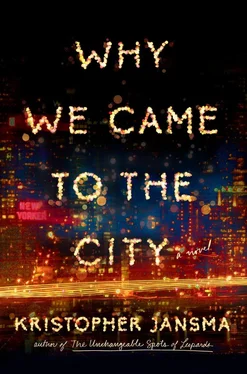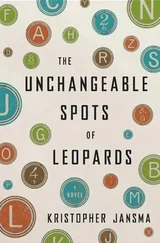The rabbi took the boy to an empty classroom and handed him an empty pad of paper. Carefully, he wrote something in Hebrew at the very top of the first page.

The rabbi said that it meant “I am not special” and that the boy would write it on every line on every page until it was full.
This took the rest of the afternoon, long past the time when the other boys were sent home. His hands ached and ached. He thought maybe his mother would rescue him from this punishment, but she didn’t come. When he finally finished, his father came to take him home. He didn’t say a single word to the boy. When the boy looked up at his father, he saw that he looked a lot like him — a little large, the same bristly hair, the same big hands.
He thought about Isaac’s blue lips. His hands still throbbed, but it was his heart that ached worse than anything else. I am not special, it beat. I am not special. I am not special .
The words were stuck in his mouth like a piece of paper, all wadded up. They were like the first line in a long, long poem that might take a lifetime to finish writing.
• • •
Jacob woke up to George’s snoring. Very slowly he came to the conclusion that he and George were lying side by side on the blue pullout couch they’d bought at the Toronto IKEA during their junior year of college, when they’d lived in a row house off campus.
However, as Jacob slowly recalled, he and George were no longer in college, and they no longer lived on East Street in Ithaca. The blue pullout resided now in his apartment, which meant that he was also in his apartment, which meant that George was in his apartment as well. This would have been bad enough, but then, very slowly, Jacob gathered from the sound of dishes being washed that someone else was there too. A third person. William Cho.
Jacob’s first instinct was to rise, thunderous from the bed, kicking and swearing until William was halfway back to Queens. But his body was in no condition for thundering. His throat was Death Valley dry, and even trying to form swear words was taxing his bruised brain.
He remembered that William had still been there at the end of the night, his face sweaty in the flashing red lights of the fire trucks. William had been supporting him and carrying George on his other arm. Jacob could still hear the echo in his ears: water, roaring behind the buildings.
“Coffee,” Jacob rasped, his vocal cords raw. He tried again, raising his voice above the rushing of the sink. “COFFEE!”
“Shush,” William said.
Jacob found it superbly irritating that he actually said the word instead of making a shushing noise, but then he figured there wasn’t much he wouldn’t find superbly irritating in his current condition.
William came over with a glass of water.
“This isn’t coffee,” Jacob croaked.
“Coffee’s just going to dehydrate you more,” William said. “You should have had water last night when I was trying to make you.”
Slowly Jacob remembered being in the back of the cab, trying to cool his sweaty cheek against the cold passenger-side window. “Were you in the cab last night?” he finally asked, slowly rising to his feet. Carefully, he crossed the treacherously piled floor to get to William by the sink.
“You and me and George. Who you’re going to wake up, by the way, if you keep shouting like that. This place has a hell of an echo… I’ve never seen ceilings this high. You’ve got more fly space than floor space in here. What is this, like ten by twelve by thirty?”
“Twenty-eight and a half,” Jacob corrected, and though he knew full well it was a bad idea, he still craned his neck back to look up at the thick oak beams in the ceiling. The act made him so dizzy, he had to sit down on the floor and lean his head against the fridge. The plastic door was wonderfully cold and smooth. He closed his eyes and thought he might just go back to sleep, but then a baby outside began wailing, so close that he could also hear its mother, crying back at the child to “please , for the love of God, stop crying! ”
“Lot of people out there,” William observed, pointing up to the barred windows, which were halfway up the high walls — too far up to see out of, but they could see the people’s shadows drifting like ghosts through the apartment. They could hear little bits and pieces of their voices — muffled and sounding like a confusion of other languages. Their shadows crawled upside down the walls, and somewhere above them, Jacob and William heard the insistent pealing of bells. It was Sunday.
“You live in the basement of a church,” William stated.
“Thank you, Captain Obvious,” Jacob replied, eyes slitted.
“When we came in last night, I thought we had to be in the wrong spot. But then your key fit the side door. I couldn’t believe it. Is this even legal?”
Jacob groaned and moved his mouth fruitlessly. Far too much effort to explain that he was sort of unofficially subletting it from the priest, the brother of a Greek Orthodox guy he’d slept with (off and on) in college who’d hooked him up with the keys when Jacob had announced that after graduation he’d be moving to the big city. What had seemed at first like Divine Providence (avoiding the months of craigslist ads and fleabag brokers that George and Sara and Irene had dealt with that first summer) had quickly become a sort of hell. The place came to feel like the kind of dungeon people got thrown into during the Spanish Inquisition. Jacob felt at times like a boy who’d fallen into a well and decided he might as well decorate.
Though decorate was a term best used loosely if at all. Jacob chewed his lip and looked around at the disheveled heaps that were his worldly possessions. The blue pullout couch, a flimsy bookshelf, and a desk made of milk cartons and an old door he’d found in the alley. These were the only pieces of furniture he possessed. The walls were bare except for a few rough starts of poems that he’d stapled, in haste and at odd angles, onto the flat surfaces around the desk. On the bookshelf was one framed photograph, of himself in a tuxedo posing alongside George, Sara, and Irene at the prize ceremony for In the Eye of the Shitstorm . The jittery MRI printout that Irene had given him was held to the fridge with a magnet from Szechuan Garden.
The apartment was boiling in the summer and freezing in the winter. His every noise echoed, making him supremely self-conscious of every movement. He had recurring dreams of being trapped at the bottom of an enormous empty swimming pool, only to wake up and find that in a sense, he was. And yet it was so cheap and peculiar that he couldn’t justify leaving. He’d settled instead on two rules: he’d spend as many nights as possible in other people’s beds, and he’d never allow George or the others to see the place — knowing full well that they’d force him to admit he’d made a terrible mistake.
Jacob felt an odd pinching in his stomach, distinct from the unease of its still containing half a liquor cabinet’s worth of booze.
“We’ve got to get George out of here.”
“Why not let him sleep it off?”
“George hasn’t ever been here. No one’s ever been here.” He tried to rush back over to the couch and promptly hip-checked the bookshelf, which teetered unsettlingly.
William shut the water off and shook his hands to dry them off. “You pulled your pants off in front of me the night we met, but no one’s allowed in your apartment?”
As anxious as Jacob was, he couldn’t deny this. “How’d you even know where I lived?”
Читать дальше













